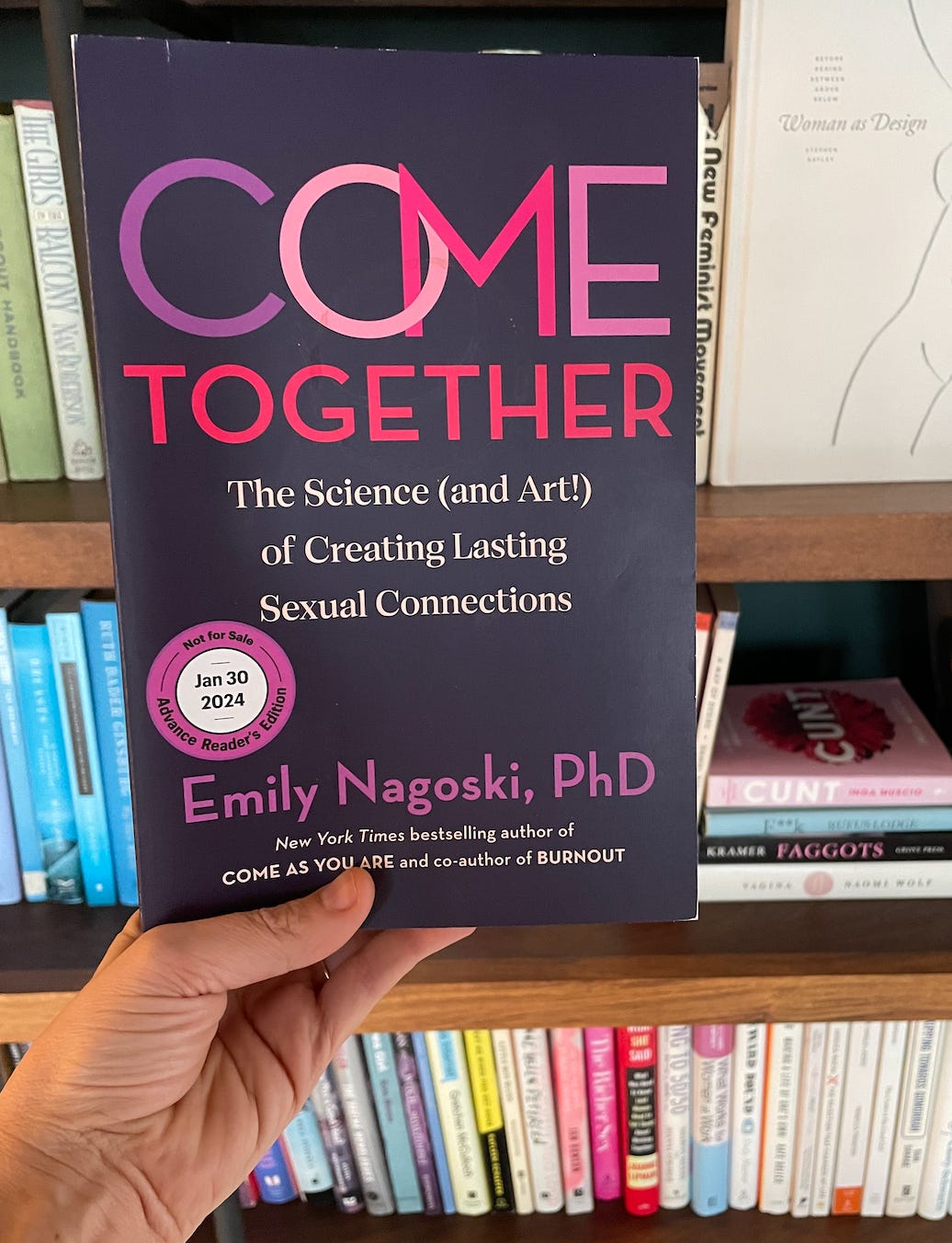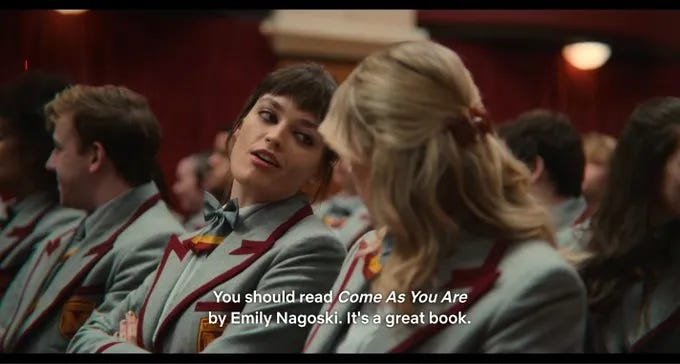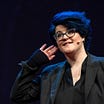Debunking 90s Sex Myths w/ Emily Nagoski
Happy Valentine's Day! I asked the sex educator and bestselling author, whose new book is "Come Together," to tell us all the ways my generation is screwed up about sex.
You’re reading Wait, Really?, a newsletter unpacking what's in the culture, with a feminist spin. Want it in your inbox? Sign up below.
Ah, the 90s. It was a decade book-ended by Anita Hill and Monica Lewinsky. It gave us MTV's Boxers or Briefs moment, popularized the concept of the MILF (thank you, American Pie) and spawned the first ever sex tape — one stolen from the home of Pamela Anderson and Tommy Lee. It was an era that inspired a decade of boob jobs, popularized the “breastaurant,” and gave us Girls Gone Wild.
But lately I’ve been wondering — in part because I have a podcast on the subject — what all of those things, the things we consumed as teenagers, taught us about love, sex and power as adults.
This question brought me to Emily Nagoski, PhD, who also grew up in that era. She’s a sex educator and the bestselling author of Burnout (written with her twin sister, about women’s stress cycles) and Come As You Are (about women’s pleasure). If you’re a fan of the Netflix series, Sex Education, you might recognize her name — at one point, Maeve tells Aimee she should read it.
Nagoski has a new book out this month, Come Together: The Science (And Art!) of Creating Lasting Sexual Connections, and I took the opportunity to ask her a few questions about all the screwed up ways we understand our sex lives — and also, if she can explain blue balls. 😳
This interview has been edited and condensed.
Emily, we both grew up in the 90s, but I get the sense we were consuming very different things during that time, in terms of media and culture. What were you into, pop culture-wise, in that era?
I mean, I have never been anyone's target audience. We literally didn't even have cable television. (Editor’s note: Neither did I, for what it’s worth!) I watched a lot of PBS. When we finally did get the beginnings of cable, in 1993-ish, I watched a lot of Inside the Actor’s Studio. But I read a lot. So my primary sex education came from a combination of women's magazines — especially Glamour — and romance novels.
What did those things teach you?
I remember very distinctly reading an article in Glamour where I learned that men really like it when women appear to be enjoying themselves, so you should make a lot of noise and ouch yourself, and you should say how much you like it, whether you like it or not. So by the time I got to sexual relationships, my assumption was that it was my job to perform pleasure without any reference to whether or not something actually felt pleasurable. It took some time for me to recognize that I was doing the stuff that they do in romance novels.
As someone who didn’t read romance novels… what they do in romance novels?
Basically, there's a script. You start with the face stuff, the boob stuff, you follow the bases, your knees fall apart, penetration happens, and you spiral upwards, enveloped in a cloud of ecstasy. It turns out that's not how it happens. So I was doing the things that the romance novels told me I was supposed to do, I was acting like a person who enjoyed those things. Eventually, I started getting really clear that there was a big difference between the things I was doing that I was told were pleasurable and the things that were actually pleasurable.

I want to back up for a moment. You were in college during the time you’re describing. Did you know you wanted to be a sex educator then?
Not at all. I was a big nerd. Like, I watched a lot of All Creatures Great and Small and Masterpiece Theater. All I knew is that I wanted to go to grad school for something. And then a guy living on my floor in my residence hall, who was pre-med, said, “Oh, come be a peer health educator with me!” [The job was to] go into residence halls and talk about health — but also sexual health, which was mostly condoms and contraception. And I was like, “I like health, why not?” So I applied and got accepted.
This was a time when sex — at least in TV and film — seemed to be everywhere. I’m thinking about, like, American Pie, Dawson’s Creek, all those teen sex movies. How do you interpret what that was about?
I think what happened in the 90s is that popular culture took the idea that sex could be a good thing for women and said, "Okay, so teenage girls are just as horny and wacky as teenage boys.” And so the way teenage girls' sexuality got represented in the media was as if it were the same as every teenage boy's fantasy.
Are there any particular films that just drive you mad?
There’s Something About Mary. Oh, Jesus. Now anyone who has actually touched any ejaculate knows that it just does not bear any relationship to the texture of hair gel. It’s a silly idea, but as a nerd, I just find it totally unbelievable and it reflects negatively on the intelligence of Cameron Diaz’s character that she could possibly mistake the texture of that for the texture of hair gel. And also, can she not smell it?


One of the things that I find so refreshing about your work is that you take commonly-held assumptions about sex and sexuality and you debunk them. Does anything ever surprise you?
Over the last few years, I’ve spent more time training professionals, and it’s sometimes distressing how many of the same misunderstandings and myths stay with them. Several years ago, I talked to a woman recently out of college. She came to a talk and she said, so this thing I learned in high school was that if you masturbate, you won't be able to have an orgasm with a partner. And she's like a full grown adult.
I was like, yeah, that's the opposite of true. If you learn how orgasm works in your body when you’re alone, that means you know how orgasm works in your body so that when you're with another person — which is a much more complex situation — you've already got the groundwork laid. Then you can teach your partner how to follow that path. I got asked almost exactly the same question by a couples therapist in a training five years later.
I need to ask you about a tweet (below). What is the phrase, “I was today years old when I learned….”?
OK, so blue balls. So, like, the deal is, no. Can it be uncomfortable to be aroused for a very long time and not have an orgasm? Yeah, there's a reason why those Viagra commercials say, “If your erection lasts more than four hours, seek medical help,” because it can be really uncomfortable. But there's nothing dangerous about it. It's a little bit like getting a charley horse. So it's not real comfortable, but the underlying narrative behind it is that boys have a sexual imperative — a need — and because it's a biological need, they are entitled to have that need met, or else something bad could happen to them. This is a narrative that has been in place for a very long time.
I'm curious how much of your work is almost about re-education — re-educating us on how things actually work after years and years and years of being misinformed?
98.9 percent of my work is simply like, “That thing you learned before? That's not true.”
What do you think is the role of media to teach us about sexual habits today?
Pop culture is so powerful because it embeds narratives in our heads of how sex is supposed to work. And I say that as someone who — even though I have all this education and experience — still find myself falling into self-critical traps of comparing my sexuality to other people’s sexuality or to the cultural narrative of how sexuality works. Like even now, as a perimenopausal 40-something lady married to somebody, when my sexual desire isn't alive, I think, like, “Oh no, there's something terribly wrong.” I wrote a whole book about how nothing is terribly wrong! And still, my first response is to panic that I’m doing it wrong, that I’m broken, that I’m an inadequate wife. So I think it clearly is very powerful, and only by having an enormously diverse range of stories — about ways you can be sexual and do sex right — do we get a liberating pop culture narrative. Does that make sense?









Glad to read something about my favorite subject. I tried the link to the book but it didn’t work. Perhaps a message to go to my real bookstore??? Anyway, at 78 sex is still super important and not just on Valentine’s Day. Keep broadcasting the message to all women that we deserve pleasure!
I recall no GFs acting out romance novels. Iff they were less than highly satisfied, they let me know. I don't go by histrionics as in When Harry Met Sally. But if the vaginal walls go into spasm, with breathing disordered, chest flushed? How fake vaginal spasms? Or anal? At least a couple GFs I'd occasionally have to stop making love as they seemed by objective indicia to be heading to passing out from the impact of repeated and/or continuing orgasm. I learned much as a frustrated teen reading letters in Penthouse. Much may have been fictional, ludicrous. But they dispelled the myth all women experience vaginal orgasms. That I should remain attentive to them, see what draws an excited response, cumulatively building. That woman are different, including the same one at different times. If I didn't remain attentive, react accordingly, doing the same thing time/again would be a disaster. Pay attention to the clitoris. I regard teaching women to fake to be unethical, destructive. I don't want to be intimate with someone I can't trust. Even with my most orgasmic GFs, they would have times when they didn't climax. I'd seek guidance, but sometimes it just wasn't there. Including if our romance was not in a good place. I don't have any fantasies. Just want to wildly satisfy my GF, whatever this entails. Short of my hurting them, no matter what "consent." I don't want to get hurt either, but games fine. Nothing magical. Want intensity, digging nails into my back, not gentle. And of course, much mutual reward. One GF told me she wanted to climax together. Usually, we did. But on this occasion, I didn't bother. I'm glad she spoke up. It was a request with her I could most always abide. So I wanted to, did. I found that most GFs liked me to hold their wrists behind them. As though restrained, but I'd let them go at any moment they indicated they wanted me to.